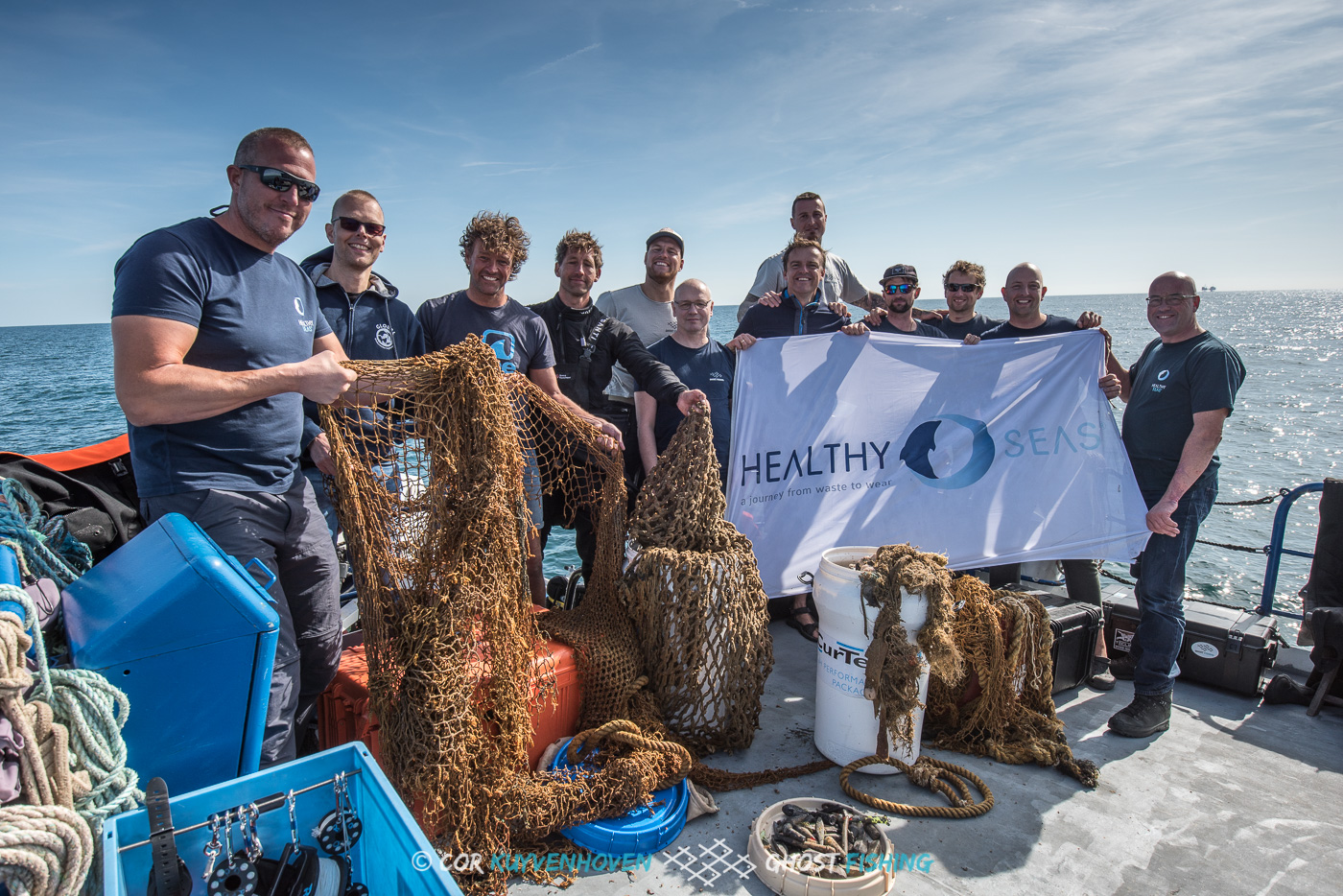PRESS RELEASE
15 October 2019
Divers and fishermen working together for a clean North Sea
Dutch volunteers in the North Sea have been diving at shipwrecks recovering ghost gear for many years. In 2013, the Ghost Fishing environmental group joined forces with the Healthy Seas initiative that offered to take the fishing nets from the divers and turn them into something useful. This collaboration became a best practice example for circular economy, inspiring other marine conservation organisations around the world as well as strengthened the Healthy Seas initiative by driving more volunteer divers to its cause.
In 2019, 65 volunteer divers that belong to both Dutch diving groups that now cooperate with Healthy Seas (Ghost Fishing and Wrakduikteam Zeester), through their passion and tenacity, cleaned up 3.000 kgs of fishing nets from shipwrecks in the North Sea. Part of the funding of these expeditions comes from the National Postcode Lottery (NPL), which gives Healthy Seas Socks as a prize to its winners. These socks are produced by Star Sock, one of the founders of the initiative.
The Healthy Seas initiative also works with fishermen at Den Oever harbour to prevent that their useless nets end up polluting the seas and oceans or sent to landfill. In 2019, 20.000 kgs of nets were collected by the fishermen for Healthy Seas. Like the ghost nets recovered by the divers, these too were processed by Nofir and regenerated by Aquafil, along with other nylon waste, into ECONYL ® yarn, a sustainable raw material used for the production of socks, swimwear, sportswear, carpets and more.
In addition, education programmes take place in the Netherlands on a regular basis throughout the year to raise awareness in young minds about ghost nets and circular economy as a solution to marine pollution. Very recently the Healthy Seas initiative was presented with the Circular Economy award at a special ceremony that closed Milan Fashion Week.
The volunteer divers of Ghost Fishing, not only remove the ghost gear from wrecks and reefs but also document their activities through photos and videos, presenting the world with evidence about the devastating effects these invisible killing devices have to marine life. It is estimated that 640,000 tons of fishing gear is left or abandoned in the seas and oceans each year (FAO/UNEP, 2009).
Diving groups around the world are following the example of the Dutch volunteer divers and as a result Ghost Fishing chapters have been established in the UK, Greece, Lebanon, Egypt, South Korea, New Zealand, Costa Brava, Malta and most recently Poland.
Photos available here:
https://www.dropbox.com/sh/0n1vyctkuw1yxu3/AABwn1oiVThiY2ycXL4-Dhepa?dl=0
END OF MESSAGE
Contact
Jenny Ioannou
Communications Coordinator
Healthy Seas
Tel: +30 6974992349
Email: [email protected]
Notes to Editors:
Healthy Seas
The mission of ‘Healthy Seas, a Journey from Waste to Wear’ initiative is to remove waste from the seas, in particular fishing nets, for the purpose of creating healthier seas and recycling marine litter into textile products. The recovered fishing nets will be transformed and regenerated by Aquafil into ECONYL® yarn, a high-quality raw material used to create new products, such as socks, swimwear, sportswear or carpets. Since its founding in 2013, Healthy Seas has collected over 500 tonnes of fishing nets with the help of volunteer divers and fishermen.
The discarded, lost, or abandoned fishing nets are sometimes called “ghost nets”, since they continue to catch fish and other marine animals without human involvement. Millions of marine animals, including sharks, dolphins, seals and turtles suffer because of entanglement in these nets which leads to serious injuries and death eventually. Every year, some 640,000 tonnes of fishing gear is left in our seas and oceans. It’s plastic waste which remains in the seas for hundreds of years and doesn’t biodegrade.
Ghost Fishing
Ghost Fishing Foundation is an international non-profit organization, executed by volunteer technical divers, which initiates, supports and promotes lost fishing gear removal initiatives in oceans, seas and local waters. Since 2012 they have run lost fishing gear survey and removal projects in the North Sea, Adriatic Sea, Aegean Sea, Mediterranean Sea, and Pacific Ocean in cooperation with various environmental organizations and with the support of a continuously growing group of volunteer technical divers.
For more information visit:
https://healthyseas.org
https://www.ghostfishing.org/



